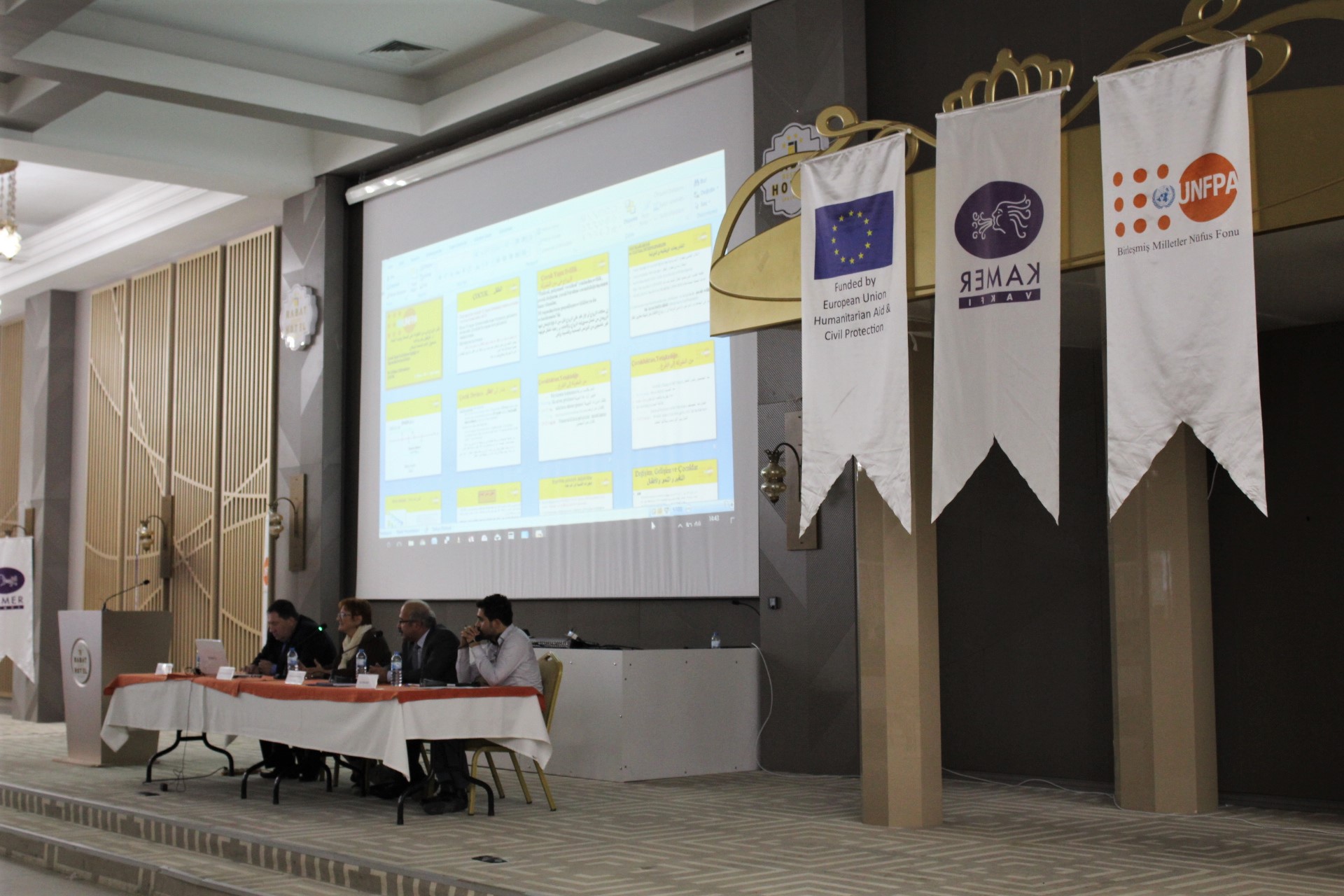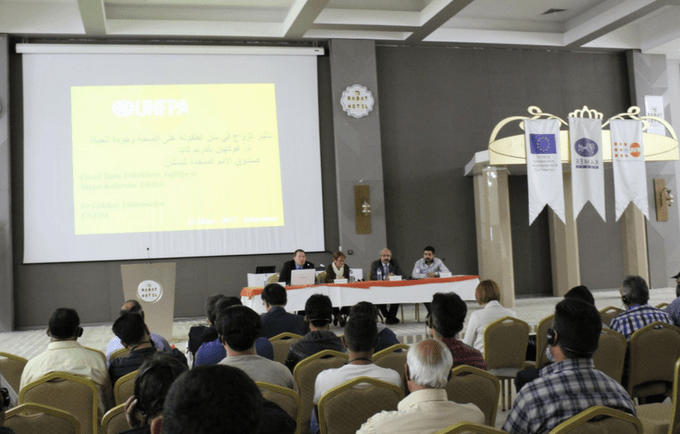Child Marriages Awareness Panel - 13 October 2017, Adıyaman
Another panel in the series of “Child Marriages Awareness Panels’’ intended for men refugees was held on October 13, 2017, this time in Adıyaman. The panel’s content was developed by the United Nations Population Fund (UNFPA) and organized in cooperation with the KAMER Foundation, the implementing partner of UNFPA in Turkey. The series of child marriage awareness panels aims to raise awareness of and draw attention to child marriages, a serious human rights violation against children, also a significant problem as a widespread practice among refugee families that seek help in Turkey. In the panel, participants held presentations on the Physical, Psychological and Social Dimensions of Childhood Marriages; Legal Status and Obligations in Early Age Marriages in Turkey. And Child Marriages from the Islamic Perspective.
Child Marriages Awareness Panel was organized in cooperation with the Foundation of KAMER, the implementing partner of UNFPA in Turkey, and funded by European Civil Protection and Humanitarian Aid (ECHO). 135 male refugees participated in the panel in Adıyaman.
In her opening speech, Fatma Hacıoğlu Sarıdağ, United Nations Population Fund (UNFPA) Humanitarian Aid Programme Regional Programme Manager said that United Nations Population Fund (UNFPA) organizes these panels in several provinces in Turkey to raise awareness against child marriages, with specific content intended for women and men refugees. Sarıdağ underlined that they organize these panels with the beneficiaries of Women and Girls Safe Spaces which have been run in cooperation with various implementing partners and financial donors within the humanitarian aid programme of UNFPA. She further said that over 30 such panels would be organized in the same concept in other provinces within.
In her opening remarks, Serpil Ateş Korkmaz, KAMER’s Adıyaman coordinator, presented the activities and projects delivered by KAMER. She said: “In this project that we have been executing with the support of the United Nations Population Fund (UNFPA), we provide, besides field surveys and house visits, services in respect of reproductive health, distribution of kits in line with the needs, psychosocial support and empowerment of women. We also refer the beneficiaries who contact our centre to the related hospitals and governmental agencies according to their medical needs and we provide translation services to overcome the language barrier. Besides, we also provide counselling and guidance services on sexual and reproductive health, domestic violence and gender equality. We, as the KAMER Foundation, make every possible effort to promote events like these to raise awareness against this problem and prevent the grave consequences of child marriages both in communities and individuals.”
Adıyaman Provincial Health Directorate’s Director Dr. H. Mustafa Kutlu underlined the biological consequences of marriage at an early age: “How can an individual who is not yet fully mature assume such a great responsibility and give birth to a child and sufficiently care for it? Besides nurturing economic and social violence in the family, the principal damage of child marriages is that they give rise to situations that can have deadly consequences for newborns and mothers. Pregnancy in child marriages brings along numerous health problems, such as miscarriage and maternal mortality being the most important problems in this respect. Due especially to underdeveloped anatomic and physiological structure of mothers in very young ages, we, unfortunately, observe high rates of miscarriages and mortality among mothers and newborns.”
Attorney Erhan İlgün, from Adıyaman Bar Association, made a presentation with the theme “Legal Status and Obligations in Early Age Marriages in Turkey?”. Attorney İlgün shared information about the legal provisions stipulated in the Turkish Criminal Law and Constitution about child marriages and individuals who marry more than one woman, also mentioning the related sanctions that can be imposed in such cases. He also underlined that, as is the case for all Turkish citizens, these laws and sanctions bind all the refugees coming from Syria as well.

United Nations Population Fund (UNFPA) Reproductive Health Programme Coordinator Dr. Gökhan Yıldırımkaya said in his presentation: ‘’Child marriage is one done by someone under 18 years of age, who is not ready yet to get married and give birth to a child considering the physical, developmental and mental maturity. Child marriage is accepted to be a human rights violation in international documents. Marrying a child under 18 years of age, for any reason whatsoever, brings along serious health risks and consequences both for mothers and newborns. All over the world women die every two minutes due to reasons arising from pregnancy, including women who lose their lives due to marriage at an early age. Besides, situations with deadly consequences, women are frequently exposed to sexual violence in marriages done an early age.’’
Associate Prof. Dr. Mehmet Nuri Güler, from Harran University’s Faculty of Theology, made a presentation with the theme “Child Marriages from the Islamic Perspective.” Stating that in Islamic law early marriage is defined as a marriage contract in which one of the parties is a child that has not reached puberty yet, he further said: “There are no verses or hadiths that directly address child marriages. Islamic law defines marriage as an act of legitimating the beneficial relationship of men with women without any religious hindrance. In line with this definition, experts of Islamic law are in agreement that a child cannot commit to a marriage contract due to her/his age and lack of legal competency.” Quoting some related verses, Prof. Dr. Güler further added: “Islamic laws rule that children must have reached the age of maturity in respect of mental health in matters concerning property share. As a marriage contract, it places similar responsibilities on an individual, experts of Islamic law agree that the aforesaid rule also establishes a precedent in this respect, and that a child must have also reached the age of maturity to be able to get married.”
United Nations Population Fund (UNFPA) Women and Girls Safe Spaces (WGSS)
One in three women in the world marries before the age of 18. Unless essential and effective studies are conducted about child marriages, it is expected that the number of women who marry at a young age will reach 1.2 billion as of 2050. The United Nations Population Fund (UNFPA) Turkey Office has been offering capacity development, service provision, reproductive health services and hygiene supplies in women's health and violence against women within the scope of the Humanitarian Aid Program since 2011.
In this respect, Safe Spaces for Women and Girls (WGSS) have started to forge cooperation with various organizations. The centers established in various cities in 2017 with the support from the European Commission Civil Protection and Humanitarian Aid Operations (ECHO), US Government, Swedish Government and Japanese Government mainly operate in sexual and reproductive health, gender-based violence, psycho-social support, empowerment and supply distribution for asylum seeker women and girls.
United Nations Population Fund (UNFPA)
The United Nations Population Fund (UNFPA) was established in 1969 as the biggest aid source with international funding in the area of population operating around the world. UNFPA operates in more than 150 countries for creating policies and strategies that support sustainable development. Having started its activities on a project basis, the United Nations Population Fund (UNFPA) has been working on reproductive health, encouraging social-gender equality, and collecting, using and distributing data about development and humanitarian aid in Turkey since 1971. Within this framework, the first Country Program lasted from 1988 to 1992 and now the Sixth Country Program (2016-2020) is being executed.
The United Nations Population Fund (UNFPA) works to deliver a world where every pregnancy is wanted, every childbirth is safe and every young person's potential is fulfilled. To this end, UNFPA focuses especially 4 of the Sustainable Development Goals (SDGs); SDG 3: Good health and well-being, SDG 4: Quality Education, SDG 5: Gender Equality and finally, SDG 17: Partnerships for Goals
Follow United Nations Population Fund (UNFPA) on social media:


